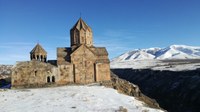The project "ROCHEMP - ARMENIA: Creation of a Regional Center for the management, conservation and enhancement of Cultural Heritage" comes to an end. It has been able to create in a year and a half a consolidated network of relationships and sharing of experiences between Italy and Armenia.

Despite the serious and unpredictable difficulties encountered in recent years, from the pandemic to the Nagorno-Karabakh war, the Rochemp project laid the foundations for a Competence Center that provided with the transfer of specific knowledge for the care of cultural heritage in all its shapes, and that it was a point of reference for the Authorities and scholars on site.The project was implemented by the University of Bologna and the Ministry of Education, Science, Culture and Sport of the Republic of Armenia, with the fundamental support of AICS - the Italian Agency for Development Cooperation. It involved professors and researchers of the Department of Cultural Heritage, with coordination functions, of the Department of Architecture, of History Culture Civilization and of the Center for Advanced Studies on Tourism of the University of Bologna, in a fruitful and constructive cultural exchange with professionals and local and international operators.
Inaugurated at the end of July 2018 on the occasion of the state visit of President Sergio Mattarella, the first of a President of the Italian Republic to Armenia, the Rochemp Center has developed several activities achieving the objectives set by the project. First of all, it has implemented five online training courses in the field of the protection and the enhancement of cultural heritage, provided by the University of Bologna, one of which in collaboration with the Smithsonian Institution and ICOM Armenia. It then developed dissemination activities in the field of cultural heritage, including an international conference and two round tables in Yerevan, as well as several Webinars with hundreds of participants from all over the world - Armenians, Europeans, Indians and Palestinians. Finally, the Center has carried out consultancy in terms of planning and regulation activities, in particular with the development of indications to improve the quality of projects in the field of cultural heritage and the proposal of a price list for restoration activities.
The Italian team and the Armenian personnel recruited for the management of the Rochemp Center interacted constructively, even dealing with hard choices to take due to the unexpected events. In fact, to compensate for the impossibility of carrying out practical exercises in the field, the staff focused their activities more on the design aspects or the use of the tools necessary for carrying out the restoration work.
The project is interrupted while the study and design activities for the restoration of the basilica of Ererouyk are still in progress, a monument of extraordinary historical and architectural importance, for which the construction of a school-site was planned. But above all, it is suspended at a time when the historical and architectural heritage of the Armenians, following the Nagorno-Karabakh conflict, has suffered extensive damage and is subjected to serious risks, to avoid which the entire international community is involved. This is the reason why there is a strong desire for both countries that this experience could continue.